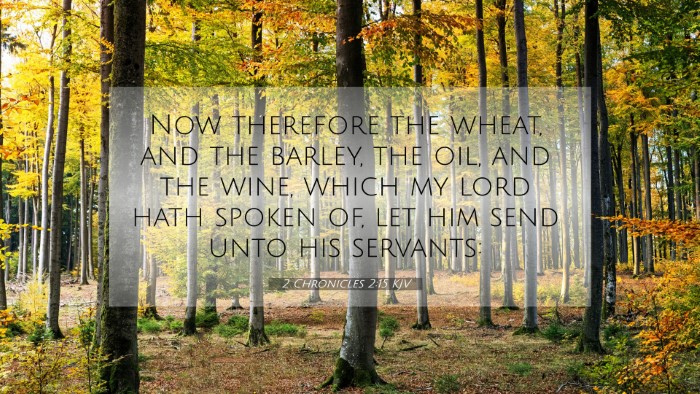Understanding 2 Chronicles 2:15
Verse Reference: 2 Chronicles 2:15 - "Now therefore the king’s servants shall bring wood and much cedar wood to thee, and the servants of Solomon and the servants of David his father shall prepare thee.”
Summary of Key Themes
This verse reflects the collaborative effort to construct the Temple of Solomon, emphasizing the importance of contribution, unity, and dedication to God’s work. It highlights both the physical resources needed and the roles of individuals in fulfilling God's divine plan.
Commentary Insights
This section combines insights from various public domain commentaries, providing a deeper understanding of the verse.
Matthew Henry’s Commentary
Matthew Henry emphasizes the significance of preparations made for the Temple. He illustrates how Solomon’s reign involved not only political strength but also spiritual endeavors. The gathering of materials represents the communal spirit and dedication to building a place for worship, representing God's presence among His people.
Albert Barnes’ Notes
Albert Barnes elaborates on the details of the resources mentioned, particularly the cedar wood. He notes the quality of materials reflects the glory of God and the magnificence of the Temple intended to honor Him. The verse symbolizes the laying of a foundation not just materially but spiritually, where high-quality offerings are made for divine service.
Adam Clarke’s Commentary
Adam Clarke examines the logistics of the effort described. He points out that the servants of David and Solomon symbolize the unity in purpose and action. This working together further underscores the importance of mutual support and the roles individuals play in the larger narrative of God's work.
Bible Cross-References
- 1 Kings 5:6: Solomon requests cedar from Hiram for the temple construction.
- Psalm 127:1: "Unless the Lord builds the house, those who build it labor in vain," emphasizing reliance on God in all efforts.
- Exodus 25:8: God's command for the Israelites to build a sanctuary for Him echoes the desire for sacred space.
- Isaiah 60:13: Reference to the glory of Lebanon that will be brought to enhance God’s dwelling place.
- Acts 7:47: Stephen refers to Solomon's temple, acknowledging its divine significance.
- Matthew 21:12: Jesus' cleansing of the temple signifies the sacredness of God's dwelling.
- Hebrews 9:24: Explains the greater spiritual reality of the heavenly tabernacle, which has implications for earthly temples.
- 1 Chronicles 22:5: David’s desire to build the temple, indicating the longstanding plan and efforts for this holy place.
- Luke 1:32-33: Prophetic significance of Christ’s kingdom, linking to the sacredness of the temple contextually.
- Revelation 21:22: A future glimpse of God dwelling with humanity, connecting the concept of the temple and divine presence.
Connecting Themes
The collaborative efforts depicted in this verse echo themes throughout Scripture, reinforcing not only the importance of building for God but also the communal nature of faith. Similar verses encourage believers to work together to fulfill God’s purposes.
- Unity in Purpose: Much like 2 Chronicles 2:15, Ephesians 4:3 inspires believers to be diligent in preserving the unity of the Spirit.
- Preparation for Divine Work: 2 Timothy 2:21 speaks about being made useful for every good work, akin to the preparations made for the temple.
- Provision by God: Philippians 4:19 reminds us that God supplies every need, similar to how resources were gathered for the temple.
- Community in Faith: Acts 2:44 illustrates how early Christians had everything in common, mirroring the teamwork seen in Solomon’s servants.
Cross-Referencing Biblical Texts
The verse stands as a pivotal moment in understanding God’s intention for His people to have a dedicated space for worship. Through various cross-references, one can see the interconnectedness of these themes throughout both the Old and New Testaments.
Conclusion
This analysis of 2 Chronicles 2:15 highlights the significance of resource gathering and community involvement in fulfilling God's commands. The verse serves as a reminder of how individual contributions lead to communal achievements in God's kingdom.




